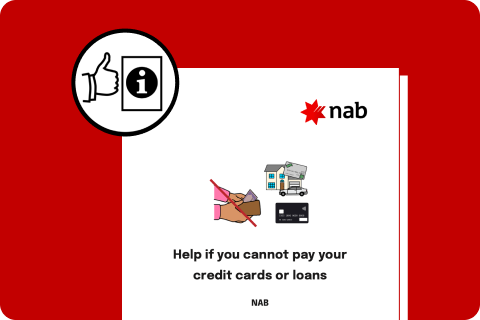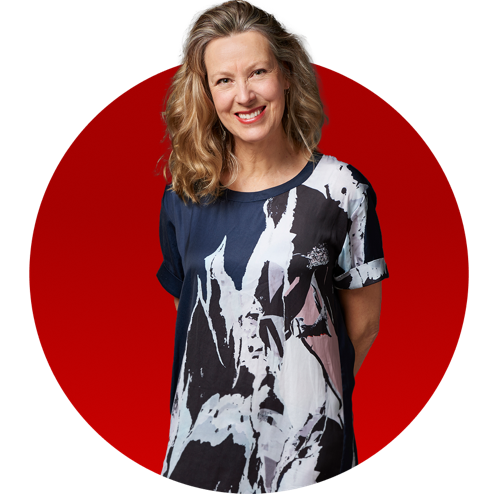Financial assistance and hardship support hub - NAB
What is financial hardship?
Financial hardship is when you’re having trouble making your regular repayments towards your bills, such as your home loan, credit card or general expenses like phone and electricity.
Needing to reach out for financial assistance can happen to anyone. Whether you’re dealing with job loss, illness, unexpected expenses or any other of life challenges, we’re here to help.
Reaching out is free and confidential, won’t affect your credit score and is the best first step towards getting the help you need.
Watch our video to learn more.

We’re here to help
If you’re feeling financially stressed or just needing a bit of extra help with your finances, we encourage you to reach out as early as possible. The earlier you contact us, the sooner we can work with you to understand your situation and consider the financial assistance options available. If your situation is urgent, we may be able to provide on-the-spot assistance.
When you might need support
There are many situations where financial assistance may be needed. Here are some examples.
How NAB can help
We can work with you to understand your situation and consider support that may be available, depending on the eligibility of your product. Here are some examples.
How to get support
Whether you need short or long term financial assistance or something more specific, our range of compassionate teams are ready to speak with you and provide tailored support.
Personal
Short-term payment assistance
For situations where you’ve recently missed a payment or anticipate missing an upcoming one, short-term financial assistance may be able to be provided.
Call the NAB Assist team on 1300 661 114
International Phone Number: +6138 6419 142
Monday to Friday, 8:00am to 8:00pm (AEST/AEDT)
Saturday, 9:00am to 1:00pm (AEST/AEDT)
Ongoing financial hardship support
If your circumstances have changed and are affecting your ability to keep up with payments over time, tailored financial assistance may be able to be provided.
Call the NAB Care team on 1800 701 599
Monday to Friday, 8:00am to 8:00pm (AEST/AEDT)
Saturday, 9:00am to 1:00pm (AEST/AEDT)
Extra care support services
Support for challenges such as health conditions, unemployment, domestic and family violence, elder financial abuse and more.
Call the Customer Support Hub team on 1300 308 175
Monday to Friday, 8:00am to 7:00pm (AEST/AEDT)
Online financial assistance
You can submit a financial assistance request through NAB Internet Banking or the NAB app. Once submitted, our dedicated team will follow up with a phone call to discuss your situation.
Business
Speak to your business banker
If you’re experiencing financial hardship, your business banker is your first point of contact and can help you understand your options for further support.
If you don't have a business banker, our Business Customer Care team is here to help.
Call the Business Customer Care team on 1300 961 577
International number +6138 6419 142
Monday to Friday, 8:00am to 5:00pm (AEST/AEDT)
Financial hardship assistance
Our Business Customer Care team is here to discuss options for tailored financial assistance if your circumstances have changed and are affecting your ability to keep up with your business accounts.
Call the Business Customer Care team on 1300 961 577
International number +6138 6419 142
Monday to Friday, 8:00am to 5:00pm (AEST/AEDT)
Need to call us back? If you’ve missed a call from the Business Solutions team, you can get back in touch by calling them directly. Call the Business Solutions team on 1300 392 545 Monday to Friday, 8:00am to 5:00pm (AEST/AEDT)
Ask someone you trust to help you
A Letter of Authority (LOA) is a document that lets us know that another person can speak and act on your behalf. For example, if you need another person’s help to speak to us about your financial difficulty and hardship. Financial counsellors, debt management companies, friends and family members are examples of people who can ask for a Letter of Authority (LOA).


Financial assistance for your needs
Support for the products you rely on, when you need it most.
Home loan financial assistance
If you're finding it hard to make your home loan payments, we’re here to help with support options tailored to your needs.
Credit card and personal loan financial assistance
If you’re having trouble keeping up with your payments on your credit card, personal loan or NAB Now Pay Later products, we’re here to help.
Business financial assistance
If your business is under financial pressure, we have support options to help you through.


Standing by Sarah during tough times
After facing unexpected medical costs and a temporary drop in income, Sarah began struggling with her home loan and credit card repayments. She reached out for support and received compassionate, tailored help. This included flexible payment options that gave her space to recover financially.
As Sarah gradually returned to full-time work, NAB stayed in regular contact to make sure the support continued to suit her needs. She said the care shown gave her confidence and stability during a difficult time. Sarah described her NAB contact as “a true pillar of strength” who helped her through one of the hardest periods in her life.


Financial assistance we’ve provided
Financial hardship assistance
Each month 10,700 customers on average call through our NAB Care teams for financial hardship support.
Specialist help
We receive on average 3,000 calls every month from customers needing extra care including those in vulnerable or complex situations.
Business support
400 business customers on a monthly average receive tailored hardship support.
*Statistics as of June 2024 to June 2025


Tools and resources
Wherever you are in life, find the tools and resources that make managing your money easier.
Use a budget planner to help you save
Whether you’re saving up for a home loan deposit or wanting to reduce your debt, use our free budget planner to create a realistic budget to help you reach your financial goals.
Tips and tricks for cutting costs
Find different ways to cut back on your spending and save more.
Money saving tips to reach your goals
Learn how to make your saving plans succeed with our simple money saving tips.
Managing your debts
Our tips on managing your debts will help you reach your finance goals quicker. We've got tools, practical steps and support contacts for you.
Why you need an emergency fund
Learn what an emergency fund is for and how to start your own.
Managing your financial health
Keep your financial health on track with our tips and tools.
Frequently asked questions
-
Yes. NAB can speak with a family member, friend or financial counsellor if you provide authorisation. This ensures your privacy is protected.
We have a dedicated team that can assist with your request, complete the Letter of Authority (LOA) (PDF, 104KB) and email the team with the completed and signed form at: customer.representative.assist@nab.com.au
-
A financial hardship arrangement is a temporary or permanent change to your loan or credit repayments when you are experiencing financial difficulty. This may include deferring repayments, making reduced or partial payments or restructuring your loan terms. If eligible, NAB will tailor an arrangement to suit your situation.
-
You do not need documents to start your application. NAB may ask about your income and expenses and request supporting documents like payslips or medical certificates to assess your situation.
-
You may be able to access your super early in limited situations. These include compassionate grounds, terminal illness, incapacity or severe financial hardship. Contact your super fund directly to apply.
-
We may assess your income, assets, debt levels and ability to resume full repayments after the support period ends. If a hardship arrangement is not suitable, we may still help by offering an alternative payment plan.
Free support is also available from financial counselling services.
Extra support when you need it
We understand that life can be challenging sometimes. That’s why we offer support for a range of situations.
Natural disaster support
Support before, during and after a natural disaster.
Domestic and family violence support
Safe and confidential help if you’re experiencing violence at home.
Financial abuse and elder financial abuse support
Support if someone is using money to harm or control you.
Unplanned life moments
Sometimes things don’t go to plan. Divorce, illness or job loss can be unexpected. Here are some tools and guides to help.
Gambling support
Help to take back control of your gambling spending.
Customer Care Kit
Explore our comprehensive guide to community support services available to you.
Accessible help for everyone
We offer a range of accessible services to help you access the right support, in the way that works best for you.
External support
Access support from our specialised external partners for tailored advice and additional assistance.
Moneysmart , opens in new window
Moneysmart is an Australian Government initiative offering free tools, tips and guidance to help you take control of your money.
National Debt Helpline , opens in new window
A not-for-profit service offering free, independent and confidential financial counselling to help you manage debt and get back on track.
Way Forward , opens in new window
A not-for-profit organisation that helps people doing it tough financially to manage and repay debts, especially across multiple banks, by working directly with lenders on your behalf.
Get in touch
Visit a NAB branch
Visit your nearest NAB branch to speak to us in person.
Give us feedback
Suggestions, compliments and complaints.
Request financial hardship assistance online
If you’re having trouble making repayments, you can request assistance via our online form.
Important information
Apologies but the Important Information section you are trying to view is not displaying properly at the moment. Please refresh the page or try again later.










